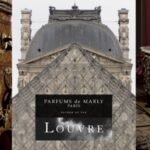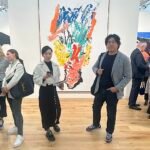Most of today’s signage tends to elicit little more than a shrug of acknowledgment. All too often, it’s not something that exactly merits much attention.
Then there are the hand-painted signs of Patrick Piccolo. One of only about 10 Bay Area sign painters, the Alameda-based craftsman meticulously hand-paints signs for barbershops, cafes, restaurants, grocery stores and other clients in exacting detail. The results are like taking a step back to a time when seemingly everything was handcrafted.
A bit of a late bloomer, Piccolo, 42, studied history at Sacramento State University and played in some punk bands at venues such as the famous 924 Gilman Street club in West Berkeley. During this time Piccolo also made graffiti art and “started to really pay attention to hand-painted signs.”
After graduating he found himself sitting in front of a computer at a nonprofit — not exactly what he considered the most inspiring gig — and, full of the do-it-yourself spirit of any punk rocker worth his salt, decided to make a change.
“I was really interested in 20th century history and commercial art of the 20th century,” Piccolo said. “And the artistic side of me liked how people pre-computers would draft things.
“There was a little bit more of a human touch to stuff. Things were a little bit funky. And so those interests kind of converged, and I realized that there were still people painting signs, and it got me psyched on it,” says Piccolo.
Because learning the hand sign painting craft is not something you can go to art school to study, Piccolo pursued an apprenticeship in the field and at the ripe old age of 30 was taken under the wing of Berkeley’s Derek McDonald at his Golden West Sign Arts studio.
“I learned pretty much everything from him,” says Piccolo of McDonald, who now paints signs for Disneyland.
Piccolo also worked at San Francisco’s New Bohemia sign painting shop before putting out his own shingle in 2014. The Oakland resident works out of cozy digs just off Park Boulevard on Alameda’s West End that he shares with two other artists.
Surrounded by tools of the trade, including a projector that beams blown-up images Piccolo incorporates into his signs on a wall where they can be traced, he was working during a recent visit on a sign for a Mexican restaurant featuring a sombrero he drew. He also has plenty of hard-to-find typography books on hand that inspire fonts he uses.
“I have all of these cool old books that I can reference how there’s rhymes and reasons to letter structure and drafting signs. This is the first stuff you learn,” says Piccolo who is also left-handed, a rarity in a sign-painting world designed for righties.
Piccolo says the design and layout aspect is the most challenging part of his work.
“The hardest part of what I do is laying out signs correctly and drafting them. The actual painting is kind of almost a secondary thing.
“It’s something that requires a lot of practice and muscle memory, but I think the craft is really in laying stuff out and the design aspect of it. I think most people can figure out how to write words with a paintbrush and make it look OK.”
This attention to the design process is what attracted Brendan Doherty, who owns the Alameda-based Signal Coffee Roasters chain of cafes, to tap Piccolo for creating the signage used in his three existing cafes as well as a new outlet opening soon in downtown Berkeley.
For Signal, Piccolo created a special font used in signage in the stores, on the windows and on one of the first things customers see when they arrive, a sidewalk or “A frame” sign. Done in gold leaf that’s actually silver in color, the font has a classic feel.
“The way we work with Patrick is we send him some of our visual assets and he puts his own touch on it so we creatively collaborate,” says Doherty. “I’m into vintage vacuum tubes and old audio, and he picks up on that. He looks into who he’s working for and what they’re about.”
Each of the chain’s shops have a different look, and Piccolo has been instrumental in developing each one.
“All of our A frames are different,” says Doherty. “All of our windows are different. He fits into what we want to do, which is make each spot special and distinct.”
And besides, he adds, the end result is a lot better than “some vinyl sign from Kinko’s.”
Piccolo can be reached through his website, signs-wonders.com.
Paul Kilduff is a San Francisco-based writer who also draws cartoons. He can be reached at pkilduff350@gmail.com.
Originally Published:




No Comment! Be the first one.